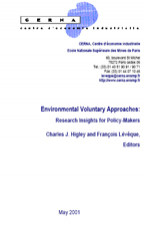Environmental Voluntary Approaches : Research Insights for Policy-Makers

01.04.2001
Charles J. Higley, Francois Lévêque
Fondazione Eni Enrico Mattei
The use of voluntary approaches has emerged in the 1990s as the most
rapidly growing — in terms of number and scope — policy instrument for
environmental management and policy in Europe. Despite their increasing
implementation, however, voluntary approaches have received relatively
little critical discussion amongst academics and policy-makers. The
Concerted Action on Voluntary Approaches (CAVA) network of researchers
organised a series of workshops on various facets of voluntary
approaches. The papers presented at these workshops provide the latest
thinking and research findings in the theory and practice of voluntary
approaches in environmental management. The materials included in this
policy brief represent a synthesis of these and other findings that will
provide some insights as to how to design and implement voluntary
approaches. The information we have distilled here is directed at three
audiences. The first are those in government departments and agencies
responsible for policy design and implementation. The second are those
in industry who are considering the use of voluntary approaches. The
third are non-governmental organisations and the general public. For all
three groups, research findings have much to offer in terms of
fulfilling the potential of this instrument.
Contributors: Regine Barth, Rinaldo Brau, Carlo Carraro, Frank Convery, Birgit Dette, Charles J. Higley, Signe Krarup, François Lévêque
The use of voluntary approaches has emerged in the 1990s as the most rapidly growing — in terms of number and scope — policy instrument for environmental management and policy in Europe. Despite their increasing implementation, however, voluntary approaches have received relatively little critical discussion amongst academics and policy-makers. The Concerted Action on Voluntary Approaches (CAVA) network of researchers organised a series of workshops on various facets of voluntary approaches. The papers presented at these workshops provide the latest thinking and research findings in the theory and practice of voluntary approaches in environmental management. The materials included in this policy brief represent a synthesis of these and other findings that will provide some insights as to how to design and implement voluntary approaches. The information we have distilled here is directed at three audiences. The first are those in government departments and agencies responsible for policy design and implementation. The second are those in industry who are considering the use of voluntary approaches. The third are non-governmental organisations and the general public. For all three groups, research findings have much to offer in terms of fulfilling the potential of this instrument.
Contributors: Regine Barth, Rinaldo Brau, Carlo Carraro, Frank Convery, Birgit Dette, Charles J. Higley, Signe Krarup, François Lévêque
